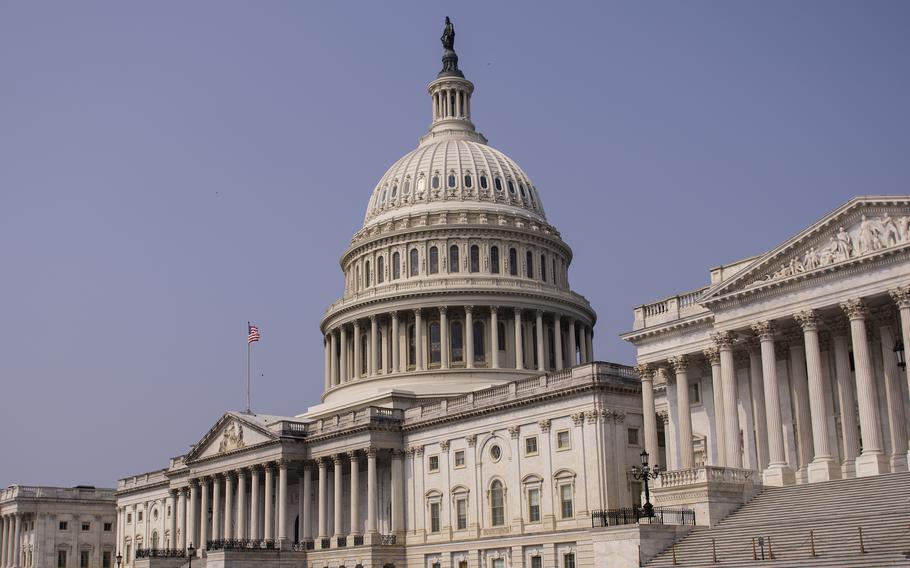
The U.S. Capitol building is seen June 30, 2023, in Washington, D.C. (Carlos Bongioanni/Stars and Stripes)
WASHINGTON — The Senate Armed Services Committee is seeking a $25 billion increase to the White House proposal for the 2025 defense budget as well as a much smaller pay raise for junior enlisted troops than approved by the House.
A draft of the National Defense Authorization Act, which sets policies and recommends expenditures for the Pentagon, was released Friday, soon after the House passed an $895 billion version of the bill that contained a 19.5% pay increase for junior ranks.
Senators voted 22-3 this week to hike up the bill’s total amount to $923 billion, in opposition to the White House request and the spending limits put in place by a debt-ceiling deal signed into law last year.
Sen. Jack Reed of Rhode Island, the Democratic chairman of the committee, was one of the members who voted against the legislation. He said the roughly $25 billion overall increase breaks lawful spending caps and causes unintended harm to the military.
“I appreciate the need for greater defense spending to ensure our national security, but I cannot support this approach,” he said.
Senate Majority Leader Chuck Schumer, D-N.Y., said the proposed budget boost would require repealing the caps from the debt-ceiling deal or reaching a new budget agreement.
Sen. Roger Wicker of Mississippi, the top Republican on the committee, was a forceful proponent of boosting the Pentagon’s budget. He laid out a plan last month that called for a $55 billion increase to fiscal 2025 defense spending as well as a “generational investment” in the military in the coming years.
The investments are necessary to boost weapons production and prepare the armed services for “the most dangerous threat environment since World War II,” the plan stated.
“My amendment to increase the budget topline is a down payment, and it keeps advancing the discussion,” Wicker said Friday. “Negotiations need a starting point, and this is not the end. I will not give up on reaching a defense level that meets the moment.”
The additional money will be used, among other things, to procure combat ships, aircraft and vehicles, according to the legislation. It authorizes an additional $1.43 billion for a third Arleigh Burke-class, guided-missile destroyer and supports the construction of a second Virginia-class submarine.
Lawmakers in both chambers have pushed for the procurement of a second submarine against the wishes of the White House. Top House appropriators have sided with the administration, however.
The Senate’s draft legislation meets the White House’s request for a 4.5% pay raise for service members while also authorizing an extra $1 billion to increase basic pay for junior enlisted troops ranked E-3 and below by an additional 1%.
Senators shied away from making sweeping changes to compensation for troops but took inspiration from the House in requiring the establishment of a commission to examine quality-of-life issues. The House pitched a 15% pay raise for junior troops after creating a panel focused on improving life in the military.
The Senate’s draft bill includes authorizations to increase funding to repair and improve enlisted barracks, raise rates for a housing allowance and give junior service members without dependents the ability to receive a basic needs allowance for housing while assigned to sea duty.
It also authorizes free high-speed internet access for troops in unaccompanied housing, requires the registration of women for selective service and requires all newly commissioned officers to receive training on the Constitution.
The legislation notably includes a provision allowing the Air Force to go forward with a controversial plan to transfer Air National Guard units performing space missions into the Space Force. The House had significantly watered down the proposal and gave governors input over such transfers.
A staff member on the Senate Armed Services Committee said Friday that senators narrowed the Air Force’s plan by including language that names the six units in the six states that could be affected as well as sets the maximum of billets that could be moved at 570.
The draft Senate bill must now be debated and voted on by the full Senate and then reconciled with the House’s version of the legislation.
Senate Armed Services Committee staff said they were not worried about finding common ground with the House, which added partisan culture war provisions to the legislation targeting abortion access for troops, transgender health care and diversity initiatives.
“[Those provisions] represent the slimmest portion of the whole bill,” said one staffer who spoke on the condition of anonymity. “We’re going to work through this like we always have.”
shkolnikova.svetlana@stripes.com
Twitter: @svetashko